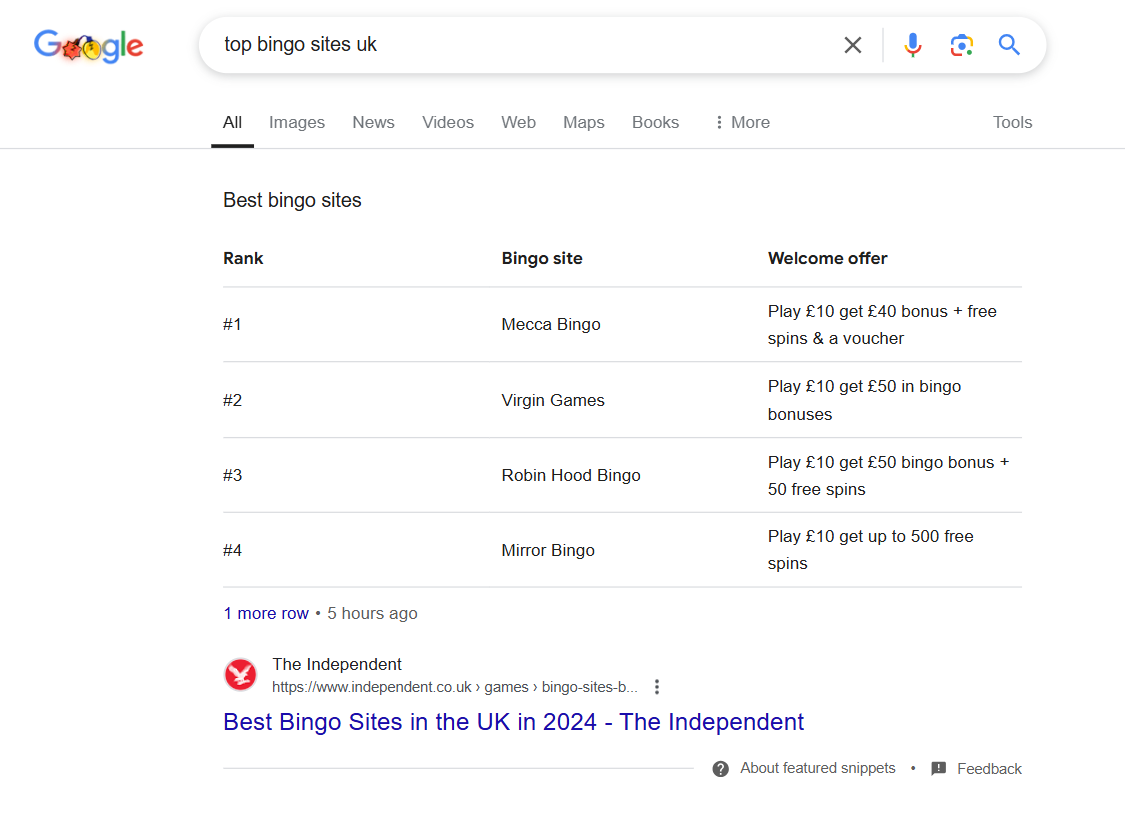

For years, igaming affiliates have been playing chess with Google, dancing around its rules and finding loopholes in its algorithms. An increasingly powerful and controversial strategy of late has been parasite SEO, a black hat tactic that allows third-party sites to hijack an established domain’s ranking signals. But with Google’s Site Reputation Abuse policy (SRA) now in force, how is the game changing – and who’s being left behind?
Not long ago, major newspapers like The Telegraph and The Independent were curiously presenting themselves as betting “experts”. Enter search terms like “best bingo sites” or “best sports betting offers”, and nearly every igaming keyword was dominated by mainstream media in Google’s SERPs. The secret wasn’t a newsroom full of veteran betting writers, but lucrative partnerships with affiliate giants who piggybacked on mainstream publishers’ domain authority for visibility.
For many smaller affiliates, those were frustrating days. Martin McGarry, the owner of a soccer stats site and an SEO consultant, likens the inundation to “the final scenes of The Matrix, where Agent Smith took over the minds of all the inhabitants”.
McGarry recalls: “Those bigger affiliates and media sites pushed everybody out. My site went from being on page one to page three for certain things. It was a sore moment for me.”
Traffic from well-known sites like CNN, the LA Times and Forbes Advisor plummeted overnight
The earthquake however hit in full force this May when Google began enforcing its Site Reputation Abuse (SRA) policy, targeting third-party pages “published with little or no first-party oversight or involvement, where the purpose is to manipulate Search rankings by taking advantage of the first-party site’s ranking signals”. Traffic from well-known sites like CNN, the LA Times and Forbes Advisor plummeted overnight. The fallout was swift, with listed affiliates such as Better Collective and Catena Media severing partnerships and laying off content writers.
In response, many publishers pivoted to building in-house teams for sponsored content. But that didn’t help either. By November, Google expanded the SRA policy to include all third-party content, regardless of the degree of first-party involvement, further removing publishers’ affiliate content from SERPs.
Now a new patrol force has parachuted into the search landscape, it might seem like bigger affiliates are losing ground. But in reality, has the table finally turned for smaller affiliates, and is SRA the end of parasite SEO?
Small equals agile?
Alexander Kostin, the founder of affiliate business Gambler Media, who recounted the impact of Google’s ranking algorithms on his British Gambler portal in Anatomy of a fall: Google updates decimate British Gambler’s search traffic, sees the potential upside of SRA. He notes that the policy “could create some opportunities for smaller affiliates in the short term by leaving space on the SERPs, especially in the difficult US market.” In the long run, though, he worries that larger affiliates and publishers will inevitably find ways to navigate around the restrictions and reclaim their dominance.
Chris Mawson, the head of SEO at ICS-digital, shares Kostin’s concerns.
“By design, actions associated with the SRA policy are meant to provide a more level playing field. The reality is a lot more nuanced,” Mawson says. According to him, not all small and medium-sized affiliates stand to benefit, as many “suffered at the hands of the Helpful Content Update in August 2023” and may have “turned to parasite SEO strategies in an attempt to claw back visibility” in desperation.
For bigger affiliates, Mawson believes that while they have experienced the greatest losses overall, they also enjoy the advantage of having a wealth of resources, which provide “the option to double down on their own properties, adapting to deliver the user-centric content Google continues to reward”.
Additionally, Mawson notes that larger companies may take a more aggressive M&A approach to “absorb smaller sites punching above their weight”, as seen in Better Collective’s recent purchases including AceOdds and Playmaker Capital, which helped the company counter revenue declines despite stagnating organic growth.
Big affiliates have the resources to double down on their own properties, adapting to deliver the user-centric content Google continues to reward
But it’s not all doom and gloom for the smaller players. Jon Earnshaw, Chief Product Evangelist for Pi Datametrics, points out that smaller teams can respond much more quickly to today’s evolving search landscape than their larger competitors.
“I’d rather be a small affiliate now, because small equals agile,” Jon explains. “If you are a small business and you are keeping your eyes on the landscape to create credible content that your audience genuinely wants to read, then you are going to win.”
In contrast, larger companies, he says, are bogged down by roadmaps and lengthy processes. “They tend to get stuck in this mentality of carrying on doing what they were doing last year because that worked really well. But things have changed, and they won’t be able to create new content in time.”
A clumsy Google
At the time of writing, The Independent’s content still ranks on the first page for many igaming keywords. The trick, as explained by Kostin, is that the publisher simply removed the “sponsored” tag and marked the content as editorial. A listicle titled “Best bingo sites in the UK in 2024” (picture below), for example, appears under the culture category and occupies the number one spot on SERP.

“The SRA policy feels very clumsy,” says Kostin. “It’s inconsistent and lacks transparency. It’s difficult to pinpoint why some sites rank higher than others, even when factoring in common sense, content quality and Google’s EEAT guidelines. Even Google doesn’t fully follow its own standards, as seen with Google Flights dominating travel-related keywords.”
According to McGarry, part of Google’s sloppiness comes from the current manual action of SRA enforcement, in which a human reviewer decides whether the site complies with the policy.
“There’s some evidence that Google has targeted bigger affiliates and media sites,” he says. “Google will probably carry on with the manual action for a long time. There’s no absolute solution to parasite SEO, and there’s still a lot of it at the moment.”
Other evasion tricks spotted by Kostin and McGarry include publishing undeclared native ads, link cloaking, hiding content using Javascript ad blockers and opting for dynamic URLs. Some affiliates have also gone rogue, hacking into WordPress sites and unmaintained CMSs to produce a steady churn of parasite pages.
In addition, Hyun Lee, an SEO consultant for Mr Gamble based in Estonia, noted that “Google’s algorithm along with SERP features are wildly different” across regions due to language and culture variations. This results in some markets, such as the US, to be more volatile than others.
It’s a broad, indirect punishment for everyone. It's affiliates’ fault for pushing too hard on the deals. it's the media’s fault for grabbing them with both hands

Nevertheless, McGarry cautions against pushing Google’s limit, as he believes the platform will tighten its regulations over time and eventually devise algorithms to counter SRA. Obsessing with loopholes, he says, will only give affiliates “more reasons to be punished” in Google’s future updates.
“Because of the rampant abuse from all the media sites, Google will probably build systems that reduce their ability in the future to rank for broader topics. It’s a broad, indirect punishment for everyone. It's affiliates’ fault for pushing too hard on the deals. it's the media’s fault for grabbing them with both hands,” McGarry explains.
A little more conversation
The year 2024 has been rocky for SEO professionals. The SRA update is only part of Google’s spam policies, alongside four core updates and the rollout of a series of features including the AI Overview. If continuing parasite SEO isn’t the solution, how should affiliates navigate the volatile market and drive traffic?
“The answer is right in front of you - build your own reputation,” says McGarry. “You will want to have a reliable service that makes someone want to come back to your site again. Then Google will take note of your content, and you will grow a clickstream on the easiest sets of keywords to rank for, the ones that belong to you and no one else.”
He warns against creating content purely to tick the algorithm boxes. “If you are just making up tips to get people to click ads, then Google just doesn’t want you around anymore because you are in direct competition with Google ads and you are not providing values.”
Meanwhile, Kostin believes that there might be a “shift away from Google” prompted by the platform’s increasing scrutiny, with affiliates exploring optimisations for ask AI engines and social media platforms. While McGarry is sceptical about the “Google Killer” myth, he agrees that affiliates “should always diversify traffic”, as visitors from other channels could help enhance a site’s domain authority in Google’s eyes.
We are in a landscape that is radically different from 12 months ago. It’s full of YouTube content. It’s full of Reddit. It’s full of Quora
Perhaps, the best way to adapt to the evolving landscape is not outwitting the intangible algorithms but focusing on real user experience. In the tides of Google updates, Reddit - along with other forums and video content - appears as the key winner, shooting up from the 78th most visible site in US search last year to third place this October.
Earnshaw attributes this to the rise of “conversational search” and Google’s emphasis on improving user experience: “We are in a landscape that is radically different from 12 months ago. It’s full of YouTube content. It’s full of Reddit. It’s full of Quora. It’s full of real people because Google is fed up with vanilla AI content and wants real user experience.”
For affiliates, the message is clear: success lies in building authentic, user-focused content. Earnshaw highlights the importance of partnering with skilled social agencies to produce engaging, first-person material that speaks directly to the audience’s needs.
“Anyone who’s being lazy, relying on ChatGPT to create content, isn’t going to work,” he warns. “But if you are really creating content to help your audience, then you should be optimistic.”
